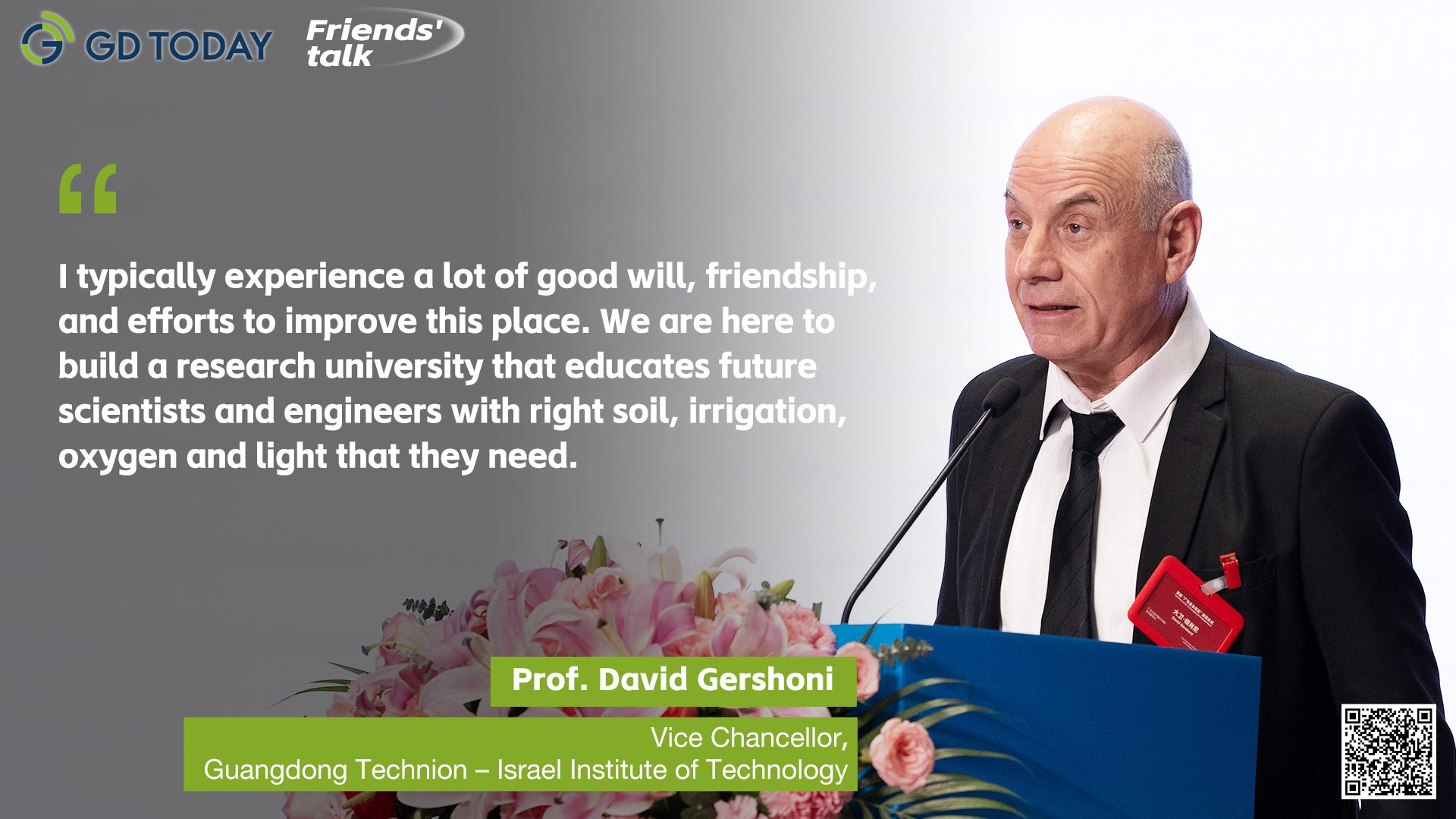Editor's Note: Guangdong recently awarded the "Guangdong Friendship Award" to 49 foreign friends from 23 countries, acknowledging those who have made outstanding contributions to Guangdong's economic and social development, as well as international exchanges. GDToday presents Friends' Talk and shares the award winners' stories with Guangdong.
"It's a great honour for me to be worthy of the 'Guangdong Friendship Award'," said Prof. David Gershoni, Vice Chancellor of Guangdong Technion – Israel Institute of Technology (GTIIT) in an exclusive interview with GDToday. "But more importantly, it is an sign that Guangdong Province appreciates the significance of this institute."
Located in Guangdong's Shantou, the GTIIT is the first cooperative educational institution between China and Israel, and was established by Shantou University and the Technion - Israel Institute of Technology (the Technion) in 2016.

"My responsibility is to ensure that the research quality we provide is the best possible, and that the students who graduate from here are the best possible," said Prof. Gershoni.
The story with Guangdong started in Israel
Prof. Gershoni's expertise is in experimental studies of optical and electronic properties of semiconductor systems of lower dimensionality and their applications in quantum optics and quantum information processing.
Throughout his career, he has published over 200 articles in world-class journals and has organized and been invited to lecture at many major international conferences and workshops.
"The President of the Technion asked me if I would be willing to come to China and be part of the management of GTIIT," said Prof. Gershioni. "I thought maybe I could do that, since I could combine science with management."
"I foresee it as a unique opportunity to really build something of value which represents the original idea of the people who established the collaboration between two great and old nations," he added.
Although Prof. Gershioni has visited China several times to attend academic conferences in Beijing and Hefei, he has never been to Guangdong until accepting the Vice Chancellor nomination. However, his story with Guangdong started in Israel.
"My first connection with Guangdong was actually made in Israel," Prof. Gershioni said as he recalled that a postdoctoral student from Guangdong visited him in Israel to apply for a job in his lab in the Technion. "I came to Guangdong for the first time when I accepted the nomination from the President of Technion to be the manager of this institute in 2021."
The distance from Israel to Shantou is nearly 5000 kilometres, meaning he has to adapt to a new environment. However, despite some communication difficulties brought on by the different languages, Prof. Gershoni is happy to remain in Guangdong province.
"I typically experience a lot of good will, friendship, and efforts to improve this place," Prof. Gershoni shared with GDToday. "My overall experience in Guangdong and Shantou has been excellent."
Having lived in Guangdong for more than a year, Prof. Gershoni has become profoundly enamoured with the energy and enthusiasm of the region.
"I think I can sum it up with 'energy,'" he said. "Although energy has a different meaning in physics, this is how I would characterize this work ethic and enthusiasm."
Success comes from education; education brings success
"Physics, for me, is the king of sciences and the forefront of sciences," Prof. Gershoni explained. "Everything was based on experimental physics."
Prof. Gershoni said that Nobel Prizes were given to three physicists last year, two of whom were experimentalists. They have proven the theory of quantum mechanics and shown the world that the entanglement is real.
"They prove the theory is correct through experiments," he stressed. "I'm an experimentalist, and I'm looking for ways to produce future technology, which drives me forward."
According to Prof. Gershoni, most of his recent research is similar to the latest Nobel Prize. He is looking for devices to accelerate the research. "I'm exploring how far the technology can be pushed in order to help humanity based on scientific understanding," he added.
As the only Sino-Israel university in China, Prof. Gershoni stressed that he wants the GTIIT to not only cultivate undergraduates, but also aim at becoming a centre for research.
"We are here to build a research university that educates future scientists and engineers," said he. "We offer them an opportunity."
Prof. Gershoni hopes that people on campus, including students and researchers, can succeed with the best support and infrastructure from GTIIT. He said, "we give them the right soil, irrigation, oxygen and light that they need."
"But to achieve success is up to them," he explained. "As long as they can be hardworking and smart."
"Education" is the word that Prof. Gershoni emphasized again and again in the interview. From his point of view, education is the foundation of everything and will bring success eventually.
"China invests a lot in education," said Prof. Gershoni. "Fifty years ago, China was a nation with a lot of illiteracy, whereas today it is one of the most educated nations."
"That is the key to success in the future," he added.
According to Xinhua News Agency, China spent nearly 4 trillion RMB in 2022, an increase of 5.5% over 2021. In terms of the budget expenditure on Education in 2023, China will spend more than 4 trillion RMB, accounting for 4% of the GDP, according to CCTV.
"Investing when you start always pays off in the long run," Prof. Gershoni concluded. "It is beyond economic estimations."
As a university focusing on science and engineering, according to Prof. Gershoni, some industrial parks are developing around the GTIIT. "If this institute is successful, it will naturally bring many industries here," he said.
With the development of GTIIT, the city of Shantou places a high value on the development of advanced and cutting-edge technology. According to Yangcheng Evening News, nearly 700 high-tech enterprises were founded in Shantou.
Moreover, Shantou recently published a policy allowing local enterprises to use the equipment on the campus for research and development.
When searing "GTIIT" on the map, people can find that more than 10 companies focusing on technology have been established around the campus, including medical equipment, metallurgical equipment and chemical engineering. All of them are related to the campus' speciality.
"Scientists, well-educated engineers nearby, and opportunities for students to work in the field all benefit the industry," Prof. Gershoni explained. "I have no doubt that the GTIIT will contribute to the economy, and to the social advancement of Shantou and the whole area."
Guangdong leads in research and education
Guangdong's GDP reached 12.8 trillion RMB in 2022, ranking first in China for 34 years in a row, according to the Guangdong Government Work Report. Moreover, Guangdong set its main economic and social development target in 2023 as increasing GDP by more than 5%.
At the beginning of 2023, Guangdong held a provincial high-quality development conference, demonstrating the province's commitment to advancing science and technology and building a "New Guangdong".
Prof. Gershoni indicated that the province of Guangdong has all the ingredients to achieve success in science and technology, including talents, financial resources and consciousness of the importance of innovation.
"Why is Guangdong so successful in China?" he asked. "I have no doubt that an important ingredient is providing an education and a good environment for the people."
In terms of high-quality development, Prof. Gershoni introduced that the province should give full play to financial resources and ensure that they can be used correctly, like investing in educational infrastructures to guarantee success.
"It takes wise leadership to understand that they must invest in research and education, and it seems like Guangdong has this leadership."
Reporter | Steven, Hannah, Zhang Xiao (intern)
Script | Steven, Zhang Xiao (intern)
Video | Guo Guo
Poster |Lulu
Editor |Wing, James


